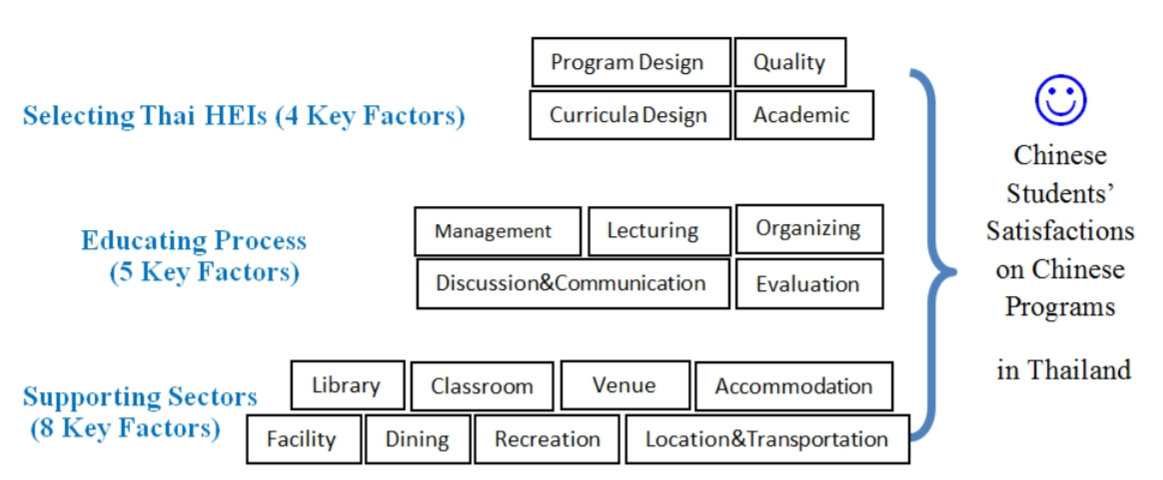Win-win or not?Factors impacting Chinese programs in Thai higher education under zero-game
Main Article Content
Abstract
Chinese Programs, initiated by Thai Higher Education Institutes (HEI) in the context of the ``One Belt and One Road'' Initiative (BRI) proposed by Chinese President Xi Jinping in 2013, have been absorbing the increasing mobility of Chinese international students to help Thailand transit to the regional education hub. This paper applies mixed methods approaches to explore the characteristics of Chinese programs as follows: To know the global international market by documenting data collecting such as qualitative research, to analyze the macro environment both inside and outside of Thailand; To inspect the key factors on Chinese programs management by questionnaire data analysis of Chinese students' satisfaction in Thailand as quantitative research. The results indicate this multi-stakeholder program is the effective approach to leverage both the inbound and outbound, public and private resources benefiting the mutual higher education cooperation between Thailand and China with rising marginal effect. This study unveils that 6% of Chinese international students are satisfied, and that there are 17 key factors affecting Chinese Programs operating on selecting Thai HEIs, Educating Process and Supporting Sectors to improve their satisfaction as a win-win deal.
Article Details
References
Congressional Research Service, China's economic rise: History, trends, challenges, implications for the United States. https://fas.org/sgp/crs/row/RL33534.pdf, 2019.
UNESCO Bangkok, The international mobility of students in Asia and the Pacific. http://unesdoc.unesco.org/images/0022/002262/226219E.pdf, 2013.
University of Oxford International Strategy Office, International trends in higher education 2015. https://www.ox.ac.uk/sites/files/oxford/International%20Trends%20in%20Higher%20Education%202015.pdf, 2015.
Y. Hongzhi, A. Ruangkanjanases, C. Chenin, Factors affecting Chinese students' decision making toward Thai universities, International Journal of Information and Education Technology 5(3)(2015) 189 - 195.
Education Office Embassy of The People's Republic of China, Proposal of operation norms for Chinese programs at Thailand universities, November 15, 2016.
UNESCO, Higher education in Asia: Expanding out, expanding up, the rise of graduate education and university research. http://uis.unesco.org/sites/default/files/documents/higher-education-in-asia-expanding-out-expanding-up-2014-en.pdf, 2014.
Malaysian Ministry of Education, Wawasan 2020 (Vision 2020). http://info.mohr.gov.my/PTK/notaPTKbaru/wawasan%202020/WAWASAN%202020%20VERSI%201.pdf, 2020.
S. Marginson, The effects of US-China trade war and Trumponomics 88 (2017) 8 -- 10.
O. Evans, The effects of US-China trade war and Trumponomics, Forum Scientiae Oeconomia 7 (1) (2019) 47 -- 55.
A. Graycar, Racism and the tertiary student experience in Australia, The academy of the social sciences in Australia. https:// humanrights.gov.au/sites/default/files/content/racial_discrimination/publications/tertiary_students/Graycar_racism_tertiary2010 .pdf, 2010.
Ministry of Education of PRC, No 1 alarm of study abroad in 2021. http://jsj.moe.gov.cn/n2/2/12110/1506.shtml, 2021.
Ministry of Education of PRC, No 1 alarm of study abroad in 2021. http://jsj.moe.gov.cn/news/2/1553.shtml, 2021.
W. M. Vagias, Likert-type scale response anchors, Clemson International Institute for Tourism $&$ Research Development, Department of Parks, Recreation and Tourism Management, Clemson University, 2006.
T. Yamane, Statistics an introductory analysis, 2nd Ed., New York: Harper and Row, 1967.
J. C. Walsh, The greater Mekong sub-region, Bangkok: Shinawatra University, 2013.
P. Chantruthai, T. Jintasuttisak, A. Primprai, High speed rail: It's time for action in Thailand, Journal of Society for Transportation and Traffic Studies 7(2) (2016) 6 -- 12.
R. J. Coughlin, Double identity: The Chinese in modern Thailand, New York: Oxford University Press, 1960.
C. Chinwanno, Rising China and Thailand's policy of strategic engagement, National Institute for Defense Studies, The rise of China: Responses from Southeast Asia and Japan, 2009.
Royal Thai Embassy, Washington D.C., Bloomberg: Thailand has the world's least miserable economy. https://thai embdc.org/2019/04/29/bloomberg-thailand-has-the-worlds-least-miserable-economy/, 2019.
Quacquarelli Symonds, QS top universities rankings in Asia. https://www.topuniversities.com/qs-world-university-rankings, 2020.
P. Wongcha-um, Thai universities tap into rising Chinese demand. https://www.reuters.com/article/us-thailand-education-china/thai-universities-tap-into-rising-chinese-demand-idUSKCN1PB07B, 2019.


